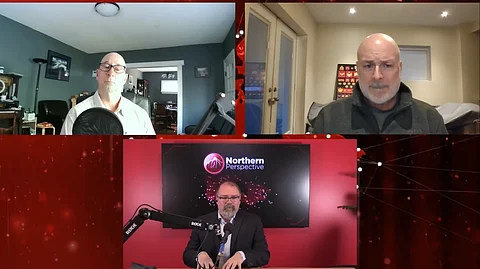

Two RCMP members who openly called for the resignation of nine cabinet ministers in a letter say they are motivated by patriotism, not politics.
Sgt. Peter Merrifield and retired Detective Paul McNamara blew the whistle on what they describe as a catastrophic breakdown in Canada's national security infrastructure and shared their reflections on the YouTube podcast Northern Perspective.
With combined decades of service in the RCMP and Vancouver Police Department, Merrifield and McNamara have witnessed firsthand the systemic failures that compromise Canadian security and individual rights. Their recent open letter to Prime Minister Mark Carney calls for immediate action against nine government ministers they believe have failed in their fundamental duties.
"We've been trying to get official government agency and government elected official attention to a very serious matter for nearly three years," Merrifield explained. His motivation stems from multiple perspectives: as a union executive, a serving RCMP sergeant, and most importantly, as a concerned citizen committed to governmental accountability.
Their complaint centres on what they perceive as rampant misuse of surveillance technologies and a disturbing pattern of intelligence mismanagement. McNamara highlighted the personal cost of these systemic failures, stating, "Not one agency in this country has told me the truth, not one minister has wanted to engage in seeking out that truth."
Their experiences reveal a troubling landscape of covert surveillance. Merrifield described how intelligence agencies like CSIS can deploy military-grade spyware that allows them to "click a button and listen in at virtually any time through your cell phone."
McNamara discovered such spyware on his device, experiencing bizarre symptoms like an overheating phone and unexplained password lockouts. The surveillance wasn't just invasive — it was potentially compromising national security.
Merrifield noted that during his high-security roles, he was escorting dignitaries like US Ambassador Kelly Kraft and hosting President Volodymyr Zelenskyy, all while potentially being monitored by intelligence agencies. Their investigation uncovered what they believe is a fundamental fragility in Canada's national security system.
"If we do not improve it," Merrifield warned, "foreign influencers like Russia and China can simply plant disinformation within the Canadian national security infrastructure, and they will run around chasing their tails."
The case of Bill Meeker, a former intelligence operative, became a focal point of their concerns. Merrifield described how CSIS seemingly manufactured allegations against Meeker and subsequently targeted Merrifield himself, conducting more investigative techniques on him than on Meeker, who was allegedly involved in actual espionage.
McNamara's own experience mirrors this pattern of institutional dysfunction. After a legitimate business trip to China to research swimming pool equipment, he found himself accused of nefarious activities, losing a five-year contract with the US State Department based on uncorroborated intelligence.
"The playing field is not level," McNamara emphasized. "If we have bad intelligence and we don't correct those mistakes, we have major issues."
Their letter targets nine ministers, not to attack them personally, but to highlight systemic failures. As Merrifield articulated, "It's not personal, it's professional. You did not do your job, and you put your hand up and took an oath to serve."
The root of the problem, they argue, is a political culture more focused on optics than governance. "The four-year electoral cycle has become a four-year politicking cycle," Merrifield said. "It's become Instagram moments, photo opportunities, three [or] two-second camera sound bites. It's lost its substance."
Their call to action is clear: Canadians must demand accountability.
"Elected politics is not a right," Merrifield stressed. "It's a choice. If you're just not up to the job, if you don't have the knowledge, skills, and abilities to execute the performance and duties, then don't be there."
Merrifield urged voters to look beyond partisan lines and evaluate actual performance and capability. "We need to park our partisan political views and really start to analyze what these people are telling us they can and will do," Merrifield advised. "What's the track record?"
McNamara echoed this sentiment: "Mistakes are made. Nobody's perfect. But when you make a mistake at this magnitude and you've been advised by two professionals who've been in the world of being accountable and transparent, I expect the same from our government and from the ministers in charge."
